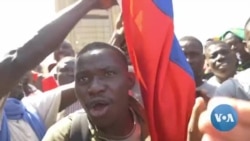Some supporters of Burkina Faso's military coup this week were seen celebrating with Russian flags and calling for their country to switch alliances from France to Moscow. While the extent of pro-Russia sentiment in Burkina Faso is unclear, there is no doubt many are fed up with French efforts to help fight gangs and Islamist militant groups.
Riding through the streets of Ouagadougou on Tuesday, two demonstrators flew a Russian flag, celebrating a military coup in the country a day earlier.
They also turned out in Ouagadougou’s Place de la Nation to celebrate the military takeover.
“No, we don’t want no more France,” one demonstrator told VOA. “We are here because we want the defense of Russia. France hasn't done anything that gives us success.”
France has been giving military assistance to Burkina Faso during its six-year conflict with armed groups linked to Islamic State and al-Qaida.
Earlier this month, the leader of neighboring Mali, Colonel Assimi Goita, welcomed mercenaries into the country from the Russian private security company Wagner, which has close links to the Kremlin.
The mercenaries took over a military base in Timbuktu that was vacated by French troops in December.
Demonstrators in Burkina Faso carried pictures of Goita at this week’s demonstration and on Jan. 22, held a march in solidarity with Mali. Police broke up the gathering using flash bombs and tear gas.
Analysts say in recent months, there has been growing anti-French sentiment and a pivot toward Russia.
Analysts say Mali is using Russian involvement as a bargaining chip after the West African bloc ECOWAS (Economic Community of West African States) sanctioned the country for refusing to hold democratic elections within the next five years.
“The Malian military junta is trying to mobilize national feeling, if you like,” said Paul Melly, an analyst with London-based think tank Chatham House. “It seems to have brought the Russians in or sought to bring the Russians in as a sort of tool of leverage. It’s not entirely clear how much practical military impact it could actually bring.”
The Russian Embassy in Burkina Faso and the military junta both declined to give VOA an interview.
Bernard Bermouga, a Burkinabe political commentator, is pragmatic about the situation.
“Whether Burkina Faso aligns with France, Russia or another country,” Bermouga said, “it’s not out of generosity. It's not free. They’ll want something in return. What is needed is someone who can help Burkina Faso get out of the situation in which it finds itself.”
Activist Francois Beogo from Burkina Faso, who attended the demonstration, said the French must let them work things out on their own. The demonstrators are not against France, he said, but France must manage their affairs and allow Burkinabe to manage theirs. Without France, he said, soldiers will have peace of mind and be able to reflect on how to organize and free the people.
Meanwhile, the Russian organization that trains troops in the Central African Republic has offered military support to Burkina Faso. It remains to be seen if Burkina Faso’s new de facto leader, Paul-Henri Damiba, will take up the offer.





